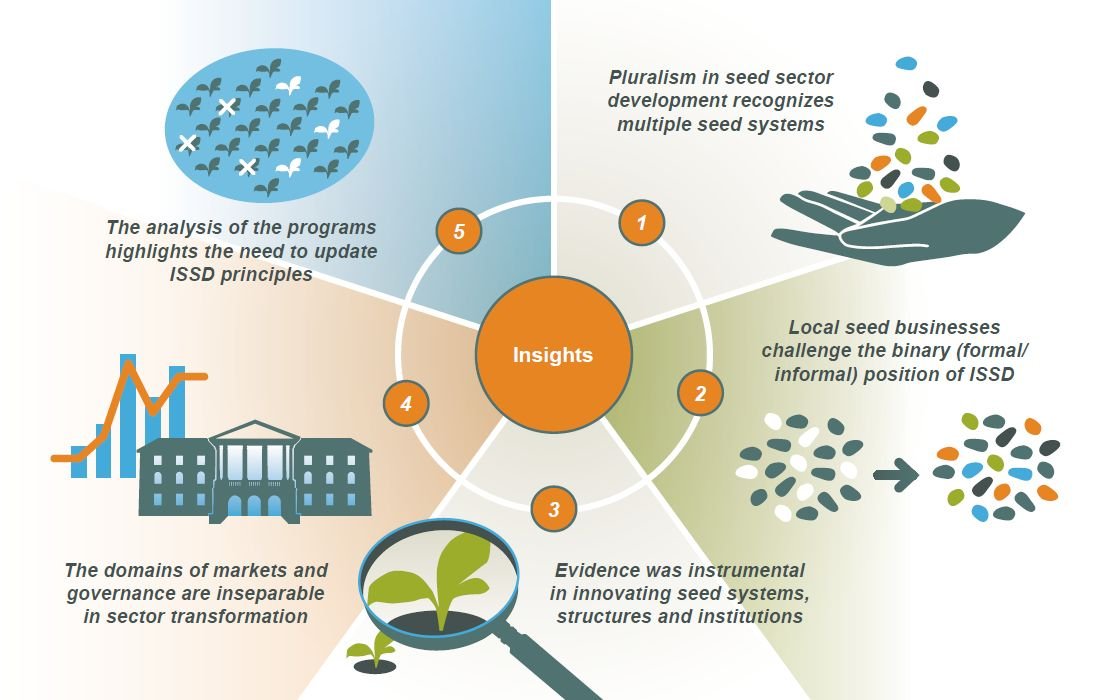Integrated seed sector development in Africa: Adaptation of the approach in national seed programs
In the special issue of Agricultural Systems on Integrated Seed Sector Development, Walter de Boef and colleagues from Wageningen Social & Economic Research reflect on their work of putting the ISSD approach into practice across various African countries since 2008. Through conversations with colleagues and partners involved across multiple programmes and phases, the article explores how they all work toward a shared goal: building more inclusive, resilient, and dynamic seed sectors composed of multiple seed systems. In this interview, Walter reflects on the process of writing the article and what struck him most in the results.
Please read the full article here: https://doi.org/10.1016/j.agsy.2025.104368
What was the reason for writing this article?
In the context of this special issue about Integrated Seed Sector Development (ISSD), I felt it was the right moment to step back and reflect on our own journey. This concept, which we began formalising in 2013, has deeply influenced our work in national programmes across countries like Ethiopia, Uganda, Nigeria and Myanmar. Over time, ISSD has guided us through our work, drawing both praise and critique at times. Given our role at Wageningen University & Research (WUR) as a knowledge organisation, we often translate broader conceptual frameworks in practice, such as with local seed business development, and engage with various types of private sector players, and in a more abstract way to support policy reform and, for example, how we structure a sector assessment and shape a seed road map. Writing this article was a way to critically assess how we’ve contributed to ISSD principles and seed sector transformation as guiding framework—and to do so in a structured, reflective manner. Because I am executive guest editor of this special issue with ISSD in the title, I considered this reflection on history of progress in programme level experiences critical, and am happy we got the analysis and were able to publish it.
How was the process of writing it?
The writing process was fascinating and insightful. We conducted interviews with people who have been involved in all national ISSD programmes and phases in the three countries. While some voiced concerns about all contributors being "insiders," we felt this was essential—they understand the principles and lived the process. For everyone involved, the reflection was personally inspiring. I also enjoyed gathering anecdotes and including quotes that brought the technical work to life. It was both fun and meaningful to weave these stories into this article.
What were the most unexpected results?
One of the biggest surprises was realising that ISSD hasn’t phased out as we had once assumed—it’s evolved. We originally expected to transition toward seed sector transformation, but instead, we’ve merged the two frameworks. ISSD remains highly relevant, particularly with its focus on pluralism, application of system thinking and governance. Some principles stayed similar, while others had to change in light of new findings. For example, we move away from contrasting formal and informal, to a spectrum of multiple seed systems. We changed referring to informal into farmer and community managed seed systems. Another takeaway was the recognition that gender integration needs to be taken more seriously. Also, while Local Seed Businesses (LSBs) are becoming more formalised, the farmer and community managed seed systems remain crucial and must be respected as a legitimate system in itself, they require specific and different attention and support. There is no single private sector, there are many and this diversity is guided by crop biology, business models and markets; the diversity is real and needs nuanced responses.
We don’t compare countries in the article because they are so different. However, we do see common patterns in countries and we use similar tools, but the choices you make what to do with the different seed systems depends on the country’s specific context.
What do you hope readers take away from the article?
ISSD is applying systems thinking in the seed sector, dealing with different components that are sometimes contrary. You engineer, you work and learn in these systems, in the policy framework, in entrepreneurship, with breeders, producers, agrodealers, inspectors and farmers. Everyone does their own small part in larger processes of innovation. At WUR, together with our partners in Ethiopia, Uganda, and Nigeria and other countries, we’ve played a key role in facilitating this collaboration. Our strength lies in combining knowledge and facilitation, while local partners bring it to life on the ground. Real sector transformation isn’t achieved in a year—it requires long-term commitment, structured governance, and innovation. This article is a testament to that ongoing journey, we are proud to be part of, but also committed to continue


